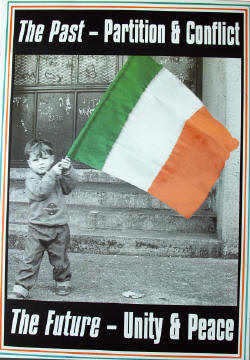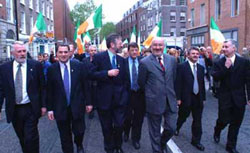 |
Irisch
Republikanische Solidarität
|
 |
INEQUALITY NORTHERN IRELAND
New statistics show that nationalist areas of the North are
being starved of inward investment while job-creation is being
directed to mainly Protestant areas.
According to British government figures, five of the top six
areas for inward investment are unionist constituencies: Belfast
East, Belfast South, East Antrim, South Antrim and Upper Bann.
The greatest amount went to staunchly unionist East Antrim,
which in itself received double the investment in the combined
border constituencies of Fermanagh and South Tyrone, Newry and
Armagh, South Down and West Tyrone.
Sinn Fein general secretary Mitchel McLaughlin has led a party
delegation to discuss the practices of the North's inward
investment agency, Invest Northern Ireland.
"The council-by-council breakdown of the Invest NI performance
shows up an even greater imbalance than the breakdown by
Westminster constituency," said Mr McLaughlin.
"These figures show that Belfast gets the lion's share of INI
support... and, within Belfast, it is south and east Belfast
which get the majority of that support.
"In comparison, the seven Border councils -- Armagh, Omagh, Newry
and Mourne, Dungannon, Fermanagh, Strabane, and Derry -- will
receive just over 20 per cent of planned investment.
"This provides proof that investment is not being directed to
Border areas despite well-documented evidence that these are
severely disadvantaged. It also undermines the argument that an
analysis of councils would demonstrate a fairer share-out of
Invest NI resources," Mr McLaughlin said.
He pointed out that the six most deprived council areas received
substantially less than south Belfast and called into question
Invest NI's adherence to Targeting Social Need policies.
The figures appear to be an example of the official
discrimination which sustains Catholic unemployment at a rate
almost twice that of Protestants.
The unemployment rate for Catholic men is 9 per cent compared
with 5 per cent for Protestant men. Among women, the
unemployment rates are 6 per cent for Catholics and 3 per cent
for Protestants.
Less than 1 in 4 senior civil servants is Catholic. In the
private sector, some of the worst offenders are Harland & Wolff,
which employs 12 Catholics versus 235 Protestants, and Shorts
Brothers which employs only 3 Catholics for every 17
Protestants.
Figures show that ill health and poverty are also a bigger
problem for the Catholic community, while Catholics are openly
discriminated against for housing.
The Housing Executive figures for 2002-03, show that in Belfast
the percentage of Catholics on the Housing Executive waiting
list for a house was 44%, yet only 28% of those actually
allocated a house were Catholic - an 'under-allocation' of 16%.
Protestants represented 43% of those on the waiting list, but
64% of those allocated a house - an 'over-allocation' of 21%.
Meanwhile, north Belfast assembly member Kathy Stanton last
night criticised the North's civil service for trying to "bypass
equality legislation by not carrying out proper equality-impact
assessments".
Ms Stanton said the role of direct-rule ministers and senior
civil servants in overseeing "clear obstruction and resistance"
to equality was "alarming".
"Sinn Fein has brought this matter to the attention of the
Equality Commission and has sought a meeting to ascertain its
opinion on this alarming approach of policy makers and those who
have ministerial portfolios over those departments," Ms Stanton
added.
Letzte Änderung:
10-Juli-05